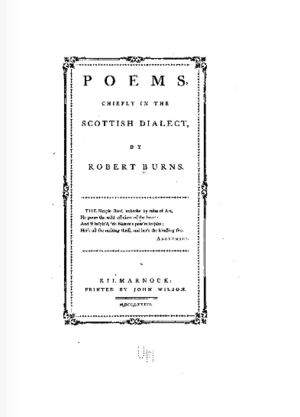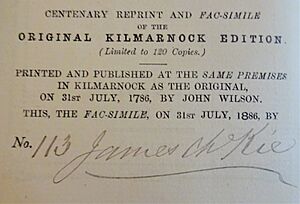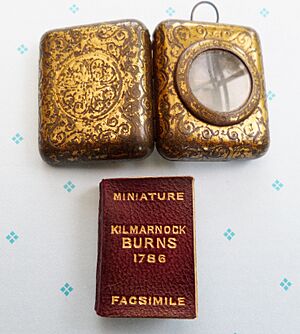Poems, Chiefly in the Scottish Dialect facts for kids

First edition title-page, 1786.
|
|
| Author | Robert Burns |
|---|---|
| Original title | Kilmarnock Edition |
| Country | Scotland |
| Language | Scots |
| Genre | Poetry and Lyrics |
| Publisher | John Wilson of Kilmarnock |
|
Publication date
|
1786 |
Poems, Chiefly in the Scottish Dialect, often called the Kilmarnock Edition, is a famous book of poems by the Scottish poet Robert Burns. It was first printed by John Wilson in Kilmarnock on July 31, 1786. This was the very first time Burns' poems were published in a book.
In April 1786, Burns announced his plan to publish a book called Scotch Poems. He asked people to sign up to buy copies. Printing started on June 13, and the first books were ready by July 31. A total of 612 copies were printed. Each book cost three shillings and came in a simple paper cover. Most people soon replaced this with a stronger binding.
The book does not have a main dedication. However, Burns included a special poem for Gavin Hamilton. Another poem, "The Cotter's Saturday Night", was dedicated to Robert Aitken.
The Kilmarnock book includes many poems that show what Scottish farm life was like. Examples are "Halloween" and "The Twa Dogs". Other poems, like "Puir Mailie" and "To a Mouse", show Burns' kind feelings towards animals.
The book starts with a four-page introduction. In it, Burns says he didn't have a lot of formal education. He also explains that he wrote his poems while working hard. The book ends with a five-page glossary. This glossary explains Scottish words from Burns' home area, Ayrshire, that readers from other parts of Scotland might not know.
Surviving Copies
Out of the 612 copies printed, about 90 are still around today. Five of these still have their original paper covers. Others have early leather bindings with a title label on the spine.
Later, in the late 1800s and early 1900s, many copies were in poor condition. Collectors often had them rebound in fancy leather with gold designs. Some surviving copies even have notes written by Burns himself. He filled in names that he had left blank in the printed book.
The Edinburgh Edition
In 1787, Burns went to Edinburgh to arrange a second edition of his poems. He met publisher William Creech and printer William Smellie. They agreed to include many new poems in the next edition. They also decided to have a famous portrait of Burns made for the front of the book.
The new book, called Poems, Chiefly in the Scottish Dialect (Edinburgh Edition), came out in April 1787. It had a long dedication to the Caledonian Hunt, a group of rich people who ordered 100 copies. In this dedication, Burns announced his goal to be a national poet for all of Scotland, not just his local area.
The new edition also had a much bigger glossary. It explained Scottish words for readers who didn't speak Scots. This expanded book cost 5 shillings. It was first printed with 2,000 copies. But because so many people pre-ordered, including a bookseller from London named Strahan, the print run was increased to 3,250 copies. This meant some early parts of the book had to be reprinted. Later that year, Strahan became the main publisher for the first London edition. It had the same title but was still printed in Edinburgh.
Facsimile Editions
Since only 612 copies of the original Kilmarnock Edition were printed, they became very rare. A publisher named James McKie realized that most fans of Robert Burns would never be able to own an original. To meet this demand, he created the first copy (facsimile) edition for collectors in 1867. He printed 600 copies, and each one was signed by him. These copies were bound in blue-gray paper, mistakenly looking like the Edinburgh edition instead of the original Kilmarnock.
Later, in the 1890s, a tiny copy of the book was made. It came in a protective case with a magnifying glass. This small version was very useful for soldiers in the trenches during World War I because it was easy to carry and protected.
Contents
Here are some of the poems included in the Kilmarnock Edition:
- The Twa Dogs, a Tale
- Scotch Drink
- The Author's earnest cry and prayer, to the right honorable and honorable, the Scotch representatives in the House of Commons
- The Holy Fair
- Address to the Deil
- The death and dying words of Poor Maillie
- Poor Mallie's Elegy
- To J. S****
- A Dream
- The Vision
- Halloween
- The auld Farmer's new-year-morning Salutation, to his auld Mare, Maggy, on giving her the accustomed ripp of Corn to hansel in the new year
- The Cotter's Saturday Night, inscribed to R. A. Esq
- To a Mouse, on turning her up in her Nest, with the Plough, November, 1785
- Epistle to Davie, a brother Poet
- The Lament, occasioned by the unfortunate issue of a friend's amour
- Despondency, an Ode
- Man was made to mourn, a Dirge
- Winter, a Dirge
- A Prayer in the prospect of Death
- To a Mountain-Daisy, on turning one down, with the Plough, in April, 1786
- To Ruin
- Epistle to a young Friend
- On a Scotch Bard gone to the West Indies
- A Dedication to G. H. Esq
- To a Louse, on seeing one on a Lady's bonnet at Church
- Epistle to J. L*k, an old Scotch Bard
- Epistle to the same
- Epistle to W. S*n, Ochiltree
- Epistle to J. R**, enclosing some Poems
- Song, It was upon a Lammas night
- Song, Now westlin winds, and flaught'ring guns
- Song, From thee, Eliza, I must go
- The Farewell
- Epitaphs and Epigrams
- A Bard's Epitaph
See also
- Address to the Deil
- To a Mountain Daisy
- Epitaph for James Smith
- Poems, Chiefly in the Scottish Dialect (Edinburgh Edition)
- Poems, Chiefly in the Scottish Dialect (Second Edinburgh Edition)
- Poems, Chiefly in the Scottish Dialect (London Edition)
- Poems, Chiefly in the Scottish Dialect (Dublin Variant)
- Robert Burns World Federation
- Burns Clubs
- Poems by David Sillar
- Glenriddell Manuscripts
 | Emma Amos |
 | Edward Mitchell Bannister |
 | Larry D. Alexander |
 | Ernie Barnes |



